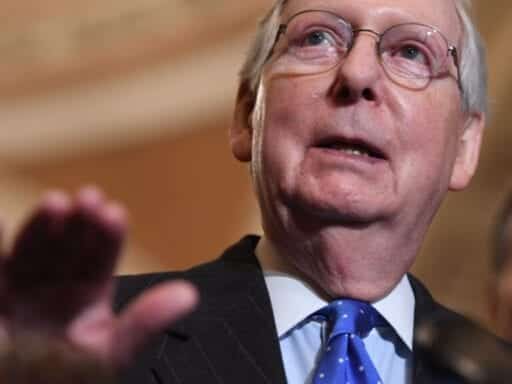But he suggested that the issue of witnesses will be decided after Trump’s Senate trial begins.
With the House of Representatives expected to impeach President Donald Trump on Wednesday, Senate leaders are preparing for a trial in January — and the first major bone of contention is whether that trial will feature witnesses.
Over the weekend, Senate Minority Leader Chuck Schumer (D-NY) sent a letter to Senate Majority Leader Mitch McConnell (R-KY) calling for testimony from four witnesses with knowledge of the Ukraine scandal: acting White House Chief of Staff Mick Mulvaney, former national security adviser John Bolton, White House aide Rob Blair, and Office of Management and Budget official Michael Duffey. Schumer also wrote that he wants Senate Republicans to agree to call those witnesses upfront.
But on Tuesday, McConnell responded to Schumer’s letter by saying he would agree to no such thing — at least not yet.
In a speech on the Senate floor, McConnell said he thought it would be “a good idea” to “adopt similar procedures to the Clinton impeachment trial back in 1999.” Back then, the Senate postponed the divisive issue of witness testimony until after opening arguments in the impeachment trial concluded.
The “tried-and-true 1999 model,” McConnell said, was to “start the trial and then see how senators wish to proceed” with regard to witnesses.
McConnell further argued that requests for witnesses should be the “House prosecutors’ job,” not the job of the Senate. The Senate will ultimately decide on whether to approve such requests, but McConnell said it’s inappropriate for senators to be make them.
All of this history from McConnell is accurate. In 1999, the Senate did put off the witness issue until after opening arguments. The House impeachment managers initially wanted as many as 18 witnesses, but the Senate ended up approving only three for closed-door depositions, and none to testify on the Senate floor.
Of course, McConnell’s own political motivations are also at play here. The majority leader has privately indicated that he opposes having any witnesses at the trial, according to CNN. He hopes that after opening arguments — and perhaps some questioning — senators will conclude they’ve heard enough and will want to vote on a final verdict.
And he’s made clear that he’s very far from an impartial actor. “Everything I do during this, I’m coordinating with the White House counsel,” McConnell announced on Fox News last Thursday. “There will be no difference between the president’s position and our position as to how to handle this.
“There’s no chance the president will be removed from office,” he added.
Yet McConnell can’t get his way by decree: He needs 51 Republicans in order to pass any measure related to impeachment trial procedures. (Vice President Mike Pence can’t serve as a tiebreaker as he can with legislation, because he can’t vote on impeachment matters.) Ultimately, senators from competitive states or those who have been critics of Trump, like Susan Collins (R-ME), Lisa Murkowski (R-AK), Mitt Romney (R-UT), and Cory Gardner (R-CO), will hold the balance of power.
If four Republicans were to defect and join the 47 Democrats in the Senate, they could pass a measure calling witnesses. But considering the partisan polarization in Congress in general and around Trump in particular, that may be a tall order.
The ultimate vote on Trump’s conviction or acquittal in the Senate, meanwhile, would require two-thirds of the Senate to remove him from office — a prospect even less likely.
Author: Andrew Prokop
Read More



